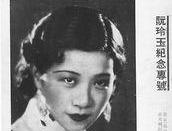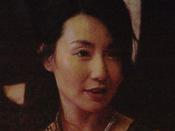Stanley Kwans' film, Center Stage rewrites the life of Ruan Lingyu and raises questions about the representation of Ruan's on-screen image and of her off-screen persona. Ruan's fragmented stories with historical details and the interaction between film directors and the female image presents the discourse of feminism, in the context of the modern woman (Zhang, 1994, pp.617) and its visual representations and the role of women in public and private domain.
Center Stage intersperses the main narrative with both clips and stills from the early twentieth century silent films it is paying homage to, as well as with its own simulations and recreations of those same early films. Brief clips from original Ruan Lingyu productions are explicitly juxtaposed with Cheung's own precise recreations of the same scenes. These moments both pay homage to the original films and delineate Cheung's own talent and unique charisma. Maggie Cheung immerses herself directly into the historical context of the films she is charged with recreating, but in the end she succeeds only in producing a surface recreation of the life of Ruan Lingyu. In their respective juxtapositions of selected scenes from the original films and Maggie Cheung's own precise recreations of the same scenes, the film suggests that even this sort of direct simulacrum fails to recapture the inherent star qualities of the Ruan Lingyu.
In this analysis, it is important to recognise how the film seeks to understand contemporary socio-cultural changes by reconstructing film history and female images from the past. To examine these notions of history and their reconstruction, Center Stage employs an inter-textual style that involves the film's narrative structure. The film's style and structure reflect the historical moment in 1997 when Hong Kong returned to Chinese rule (Berry, 1992/3, pp.44).
In its pre-title sequence, Center Stage indicates a...



Very helpful
very well written. analytical, discursive and evaluatory. good source for research.
2 out of 2 people found this comment useful.